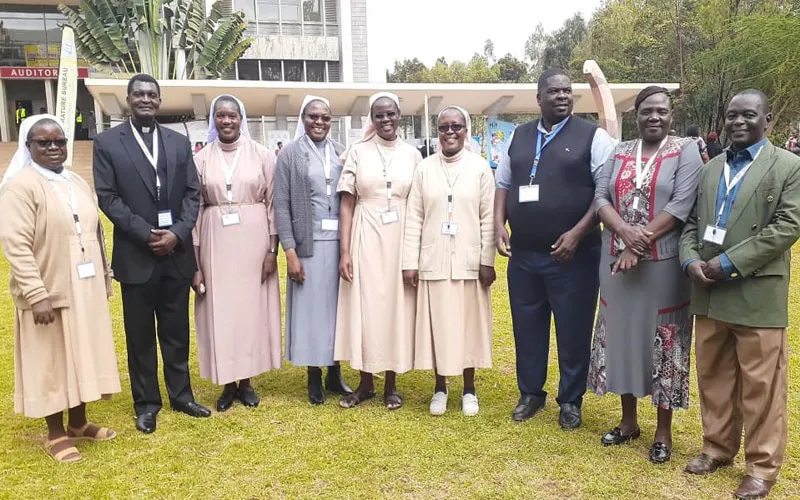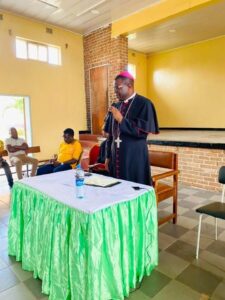KENYA: School Chaplaincy, Pastoral Instructions Key in Holistic Formation of Learners: Catholic Teachers Told

Sr. Jecinter Antoinette Okoth, FSSA
Programs of Pastoral Instruction (PPI) and school chaplains that provide spiritual and pastoral care to students, staff, and the school community, are vital in an educational environment for holistic formation of learners, Catholic Bishop at the helm of the Commission for Education and Religious Education (CERE) of the Kenya Conference of Catholic Bishops (KCCB) has said.
Addressing hundreds of participants during the opening of the 10th edition of the Catholic Private Education Institutions Association (CaPEIA) Conference at the Catholic University of Eastern Africa (CUEA), Bishop Paul Kariuki Njiru noted that having school chaplaincy and PPI contributes to the holistic development of learners which is in line with value-based education.
“Beyond academic learning, these initiatives provide crucial support for learners’ emotional, spiritual, and moral well-being,” Bishop Kariuki said on Tuesday, April 16, emphasizing that the presence of a chaplain in schools “offers a trusted confidant and mentor for learners, offering guidance, counseling, and a compassionate ear during times of joy, struggle, and crisis.”
Stressing the significance of PPI and the need for schools to strengthen its provision in schools, the local Ordinary of Kenya’s newly created Diocese of Wote said this program empowers learners to be well positioned in facing life challenges.
“PPI offers an opportunity for learners to explore questions of meaning, purpose, and ethics, helping them to develop a strong moral compass,” the Prelate said emphasizing that when PPI is integrated into the educational experience, “Schools not only equip learners with the tools they need to navigate life’s challenges, but also cultivate a nurturing and inclusive community where all members feel valued and supported in their journey towards personal growth and fulfilment.”
The three-day conference themed Catholic Schools: Hubs of Foundational Learning and Integral Formation for Holistic Growth makes meaning to the mission of the Catholic Church that embraces education as a significant component in the apostolate.
“Catholic education is found on the principle of faith, service, and excellence, providing students with a holistic learning experience that nurtures their spiritual, intellectual, and moral growth,” the Bishop narrated noting that Catholic schools rooted in the teachings of Jesus Christ strive to “Instil values of compassion, integrity, and social justice in the learners, preparing them to become all-round members of the society.”
According to Bishop Kariuki, borrowing his inspiration from Pope Francis’ message on the mission of Catholic education, the role of teachers is very crucial in the evangelization mission of the Church since it is a role ordained by God since “Christ Himself was the greatest teacher of all time and he serves as the ultimate example for us to emulate.”
The bishop acknowledged that the education sector is facing many challenges and threats yet teachers need to “stay informed, proactive, and compassionate to ensure that schools remain sanctuaries of support, guidance, and resilience against these threats.”
Some of the challenges as noted by the Bishop include; the “perversive influence of social media, cyberbullying, entrenchment of LGBTQ+ (Lesbian, Gay, Bisexual, Transgender, Queer), rise in mental health issues, and religious extremism.”
He added that the rising cost of living leaves parents in a state of whether to buy food for their children or pay school fees.
Amidst these challenges and threats, the Kenyan Prelate emphasizes that holistic and value-based education in Catholic schools remains significant in the lives of learners and in forming them on how to brave the challenges.
“in a world where technological advancements have outpaced ethical considerations, it is necessary that we equip our learners not only with academic competence but also with a strong moral compass,” Bishop Kariuki explained adding that holistic education encompasses nurturing “the intellectual, emotional, social and ethical dimensions of our student’s development, and fostering a deep understanding of oneself and others and the world around us while instilling values of empathy, integrity, respect, and responsibility.”
He also appreciated the ten years of CaPEIA since its inception and acknowledged the good work of the private schools encouraging the teachers to continue networking with the ultimate goal of improving quality, effectiveness, and efficiency in the teaching profession.


